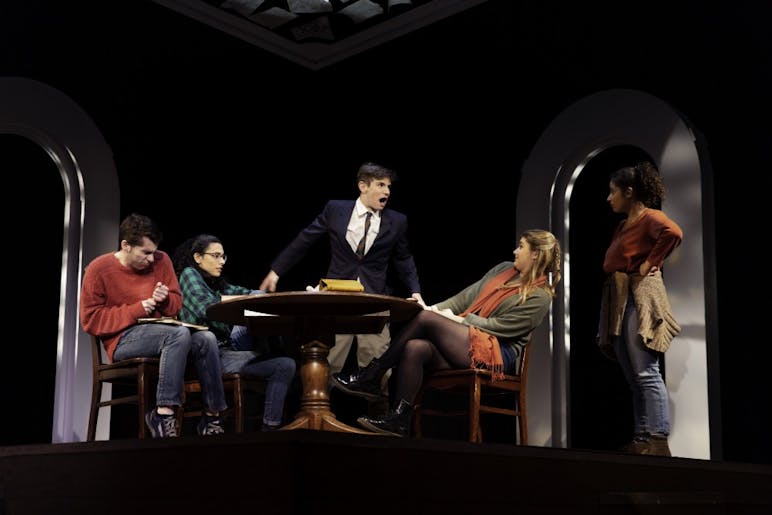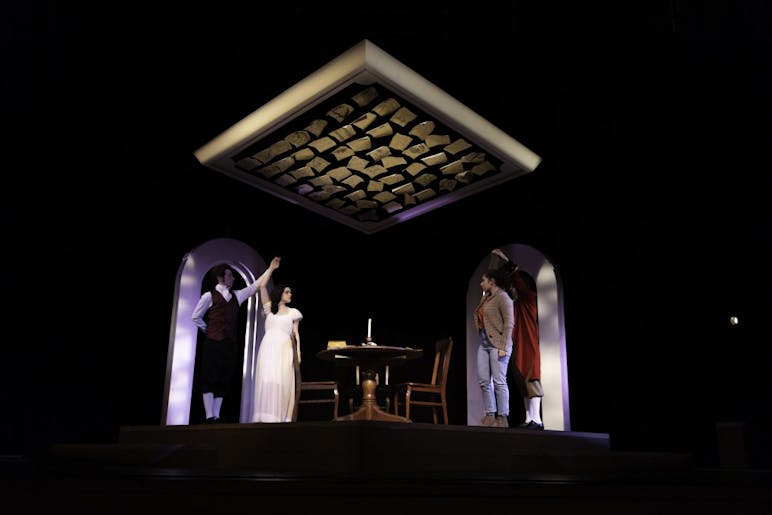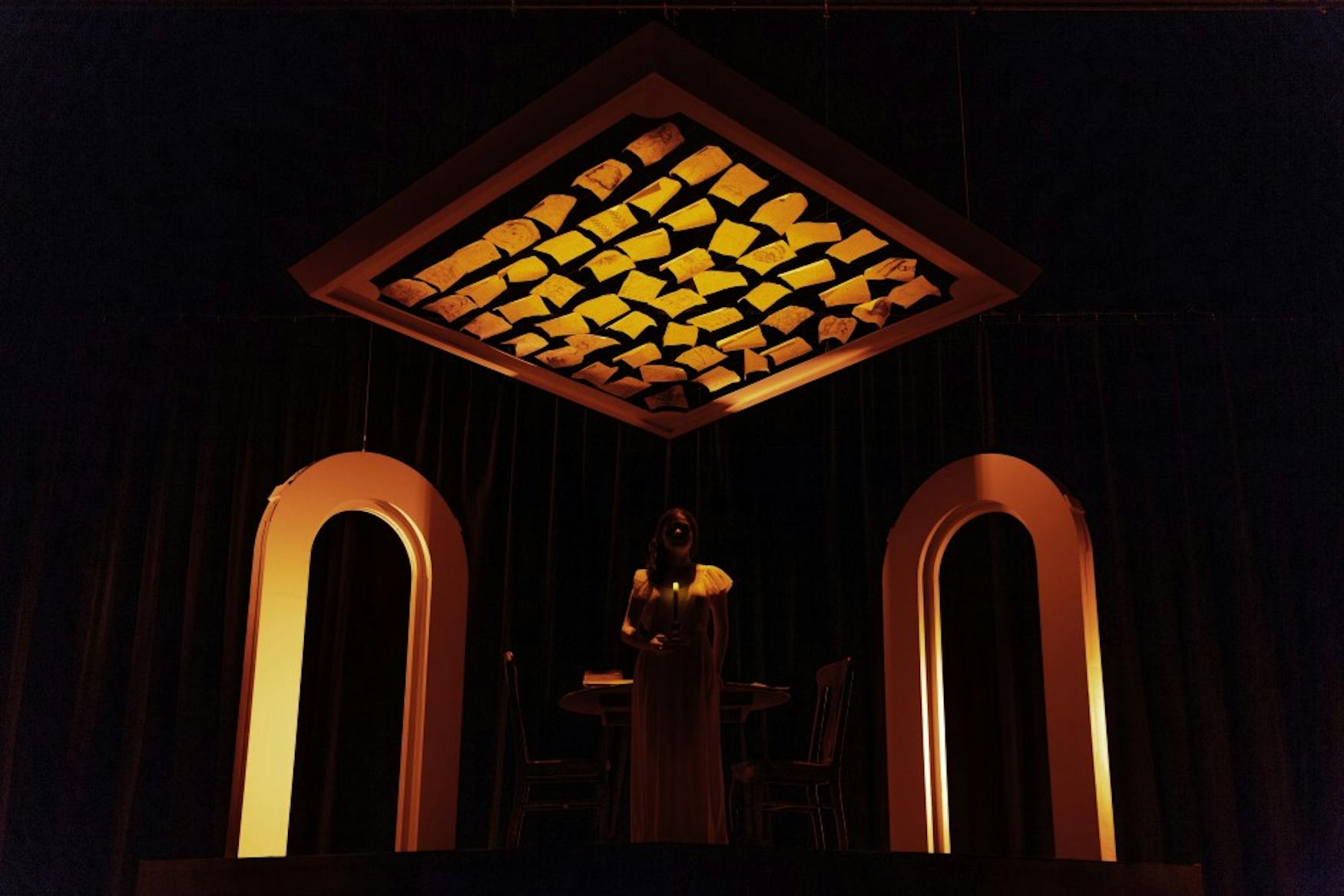‘Arcadia’ exceeds expectations
“Our production highlights how women were and are treated in academia, and the footprint they leave behind for those you follow.” Sarah Salinger-Mullen’s ’19 director’s note rings true in her interpretation of Tom Stoppard’s “Arcadia.” The 1993 British play was produced by the Undergraduate Theater Collective March on 14-17 in the SCC Theater. The play takes place in one room of a country house, Sidley Park, during two different time periods separated by 200 years: the early 1800s and the present day.

The older story revolves around precocious thirteen-year-old Thomasina Coverly. Her gifted comprehension of science, mathematics and nature allow her to have spirited conversations with her tutor, Septimus Hodge. The two discuss everything from determinism to entropy to “carnal embrace.” The two are interrupted now and again by house patrons such as Ezra Chater, a poet who catches his wife having an affair with Septimus, and Lord Byron, famed real-life British poet for his adventurous and bold lifestyle, who is never seen on stage.
The present-day story follows the research of historians Bernard Nightingale and Hannah Jarvis. Bernard is investigating his theory that Lord Byron killed Chater in a duel while Hannah is studying the life and identity of the hermit of Sidley Park. The two argue over Bernard’s theory in the company of the current Coverly family, eighteen-year-old Chloe and mathematics graduate student Valentine.
The script weaves in and out of themes such as the importance of one’s legacy, the paralleling movement of entropy and time and the connections between complex mathematic algorithms and nature. Stoppard’s dialogue incorporates ideas from such disparate sides of academia with a deft grasp of the scientific and philosophical theories discussed. This is probably one of the best scripts selected by the UTC. However, there were some long-winded monologues that made it feel like the play was also produced by Brandeis’ math department.
A play like this gives me hope that Brandeis’ theater community can create truly great work. After attending many productions, “Arcadia” might be one of the best. Salinger-Mullen’s direction is smart and grabs your attention. Upon entering the theater, her collaboration with Jacob Bers ’20 resulted in a sleek set design that combines the past and present well with tall arches and a beautiful ceiling hovering above an old table. Noah Mark’s ’19 lighting perfected the tableau with vivid shades of orange to denote passion and blue whenever a Coverly monologued about the connection between nature and math.
Now, we must not forget the ensemble cast. There isn’t really a single performance that dragged the others down. Some of the best performances were Eliana Weiss ’21 as Thomasina, Peirce Robinson ’22 as Septimus and Mia Rubinstein ’22 as Hannah. These three offered the most consistent performance among the ensemble cast, delivering their lines with passion and expertise, considering how multifaceted some the dialogues and ideas were. Weiss was a compelling female academic to root for, Robinson was a charming sound board for her and Rubinstein was a curious rival to Bernard.
That final performance could not be done without Jason Frank’s ’22 entertaining bout as Bernard. Though his portrayal was a bit uneven as times, he delivered some of the funniest scenes and interesting lines. The way he played off Rubinstein made for some engaging chemistry, but I preferred the 1809 scenes more. Weiss and Robinson were delightful in every scene, whereas the present-day scenes dragged at times. When one of the opening lines by Weiss was “is love the same as sexual congress” and Robinson responded “no, it’s better than love,” the confidence between them immediately struck me — I noted that mostly adults laughed at that retort.

Sheppard’s words about the universe being deterministic and time being irreversible played well with the subject matter. Salinger-Mullen portrayed that yearning for legacy through these ideas creatively by playing with the movement of the characters from both times while occupying one space. One could really understand the clash between the old and new in these scenes.
Overall, I’d say it was a pleasure to catch this production. It gives me hope for the future, as theater season is coming up and the seats are getting filled. It’s a shame more people didn’t attend, but maybe the upcoming UTC projects will follow suit. Salinger-Mullen, the cast and the crew gave it the aptly appropriate “college try” and came out on top.
—Mia Rubinstein ’22 is an editor for the Justice.




Please note All comments are eligible for publication in The Justice.